Health
Do Doctors Ask Patients The Right Sexual History Questions?
December 01, 2017 by Dr. Evan Goldstein
When a patient goes to see a doctor for the first time, their medical history is often one of the very first things discussed. We’ve all filled out forms or answered questions about our allergies, previous surgeries, and family history of certain illnesses. By having this information, doctors can provide better care for patients. But, talking to your physician specifically about your sexual history and your current habits can be an uncomfortable subject.
The LGBTQ+ community in particular faces unique challenges when it comes to both relating to their doctor and also getting the best care possible. While being LGBTQ+ is much more accepted in today’s society, the level of acceptance can vary significantly depending on where you live in the United States. And if discussing your sexual identity isn’t an issue, there is a chance your doctor may not be familiar with the specific care that comes with being part of the LGBTQ+ community.
With some of these issues in mind, Bespoke Surgical recently conducted a study on doctor-patient relations, asking over 1000 Americans of all ages and sexual identities a variety of questions in an online survey relating to what they’ve been asked by their doctor and how comfortable they are talking to their doctor about sex.
Our Findings
One of the first things we wanted to look at was what doctors are asking their patients. We found that over 50% of people were not asked about HPV/Guardasil, anal pap smears, PrEP/Truvada, or prior STD exposure.
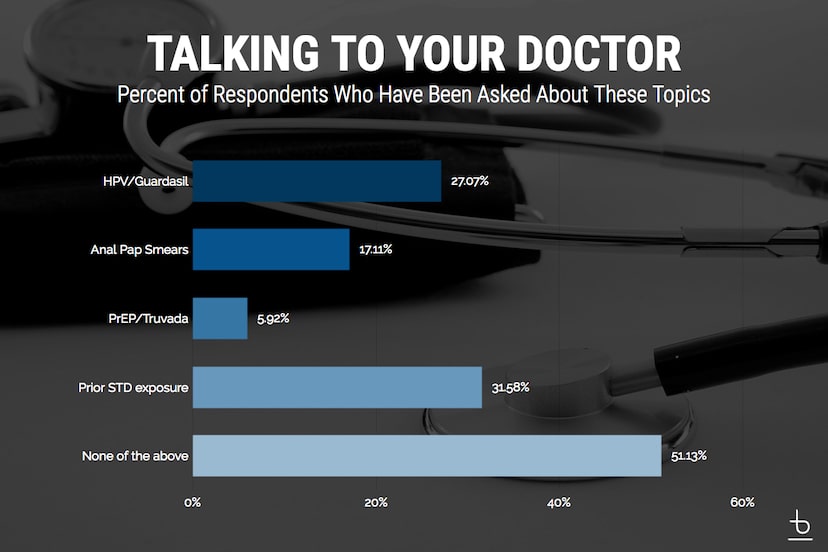
When analyzing the data by sexual identity, there were a few differences that stood out. The first is that straight respondents were 10% – 30% more likely than gay or bisexual respondents to say that their physician hadn’t asked them about any of those things. Those questions are some of the most important for the LGBTQ+ community, so it is a positive thing to see that more gay and bisexual respondents said they were being asked. Another interesting stat from this question is that bisexual respondents were 40% more likely to be asked about prior STD exposure. The B in LGBTQ+ is often misrepresented in a variety of settings, including sexual promiscuity.
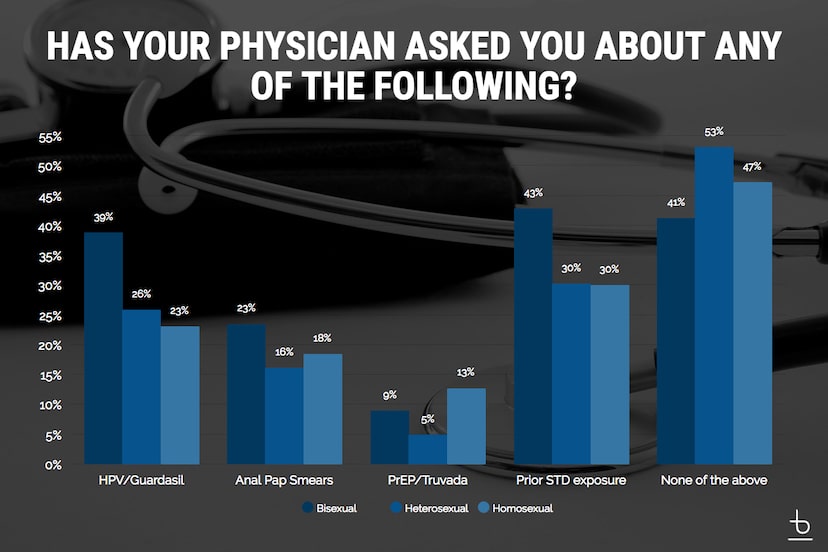
Next, we asked respondents what their doctor had asked them about their sexual history. Some of these were general, such as the type of relationship you’re in, and others were more specific, like what sexual acts and/or fetishes you’ve explored. At first glance, it might seem out of place for a doctor to ask about sexual fetishes, but this goes back to getting a complete medical history. If a patient regularly participates in things like fisting, BDSM, or watersports, they may need different care than someone who doesn’t.
The results of our question showed that nearly half of respondents said they had been asked about their relationship status–the highest response rate of any topic. Use of protection and/or PrEP was second at 40%, and frequency of sexual activity was third at just under 29%. The two questions about fetishes were in the bottom three.
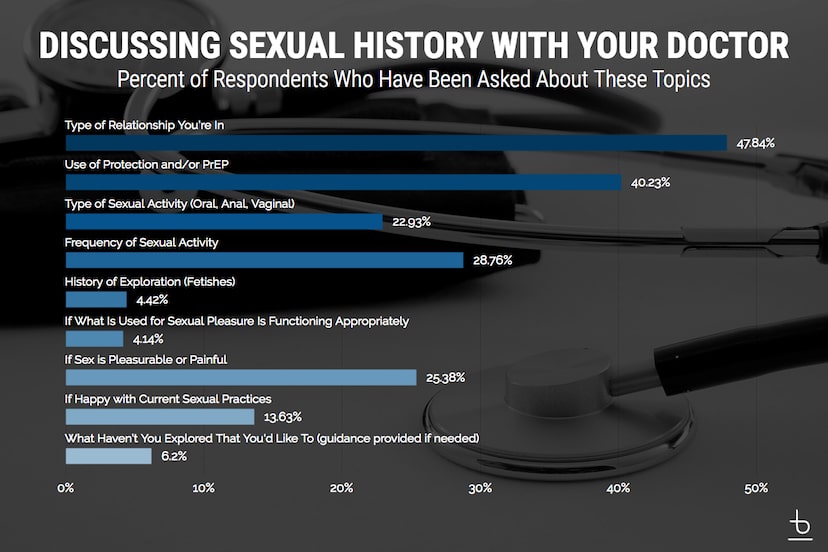
Looking at the results based on sexual identity, there were some clear distinctions. Straight or bisexual people are 30% more likely than gay individuals to be asked about their relationship status. Bisexual respondents reported that they were considerably more likely than straight or gay respondents to have been asked about sex being painful or pleasurable. Additionally, they’re also asked significantly more about sexual exploration, both past, current, and future. This seems to relate to the previous question on STD exposure and the misconception of bisexual people being more promiscuous.
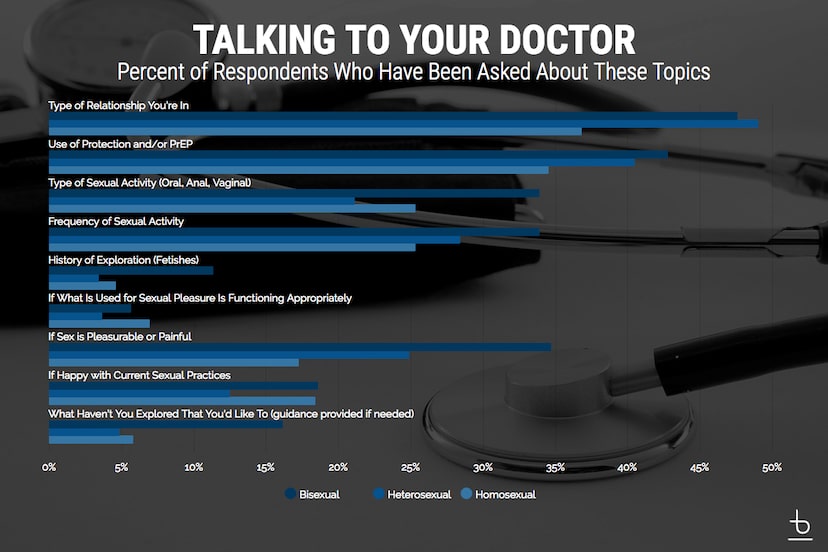
In the next series of questions, we asked about comfort levels and how honest patients are with their doctors.
We asked about the importance of having a doctor with the same sexual identity as you, using a 1 – 10 scale where 1 was not important and 10 was very important. Being able to relate to your doctor on a personal level is a key factor in getting appropriate and comprehensive care. What we found is that many people see having the same sexual identity as their physician as something they value, especially LGBTQ+ individuals. Bisexual and homosexual respondents were 20% – 30% more likely than straight respondents to answer with a 9 or a 10 (very important). It’s clear that have a mutual understanding with your doctor is something patients want.
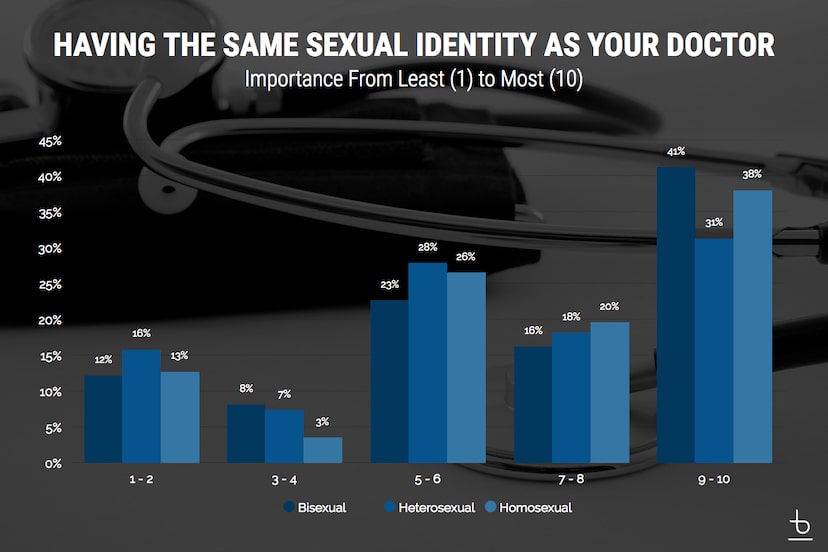
When it came to comfort level on discussing their sexual history on a 1 – 10 scale, most people said they were a 9 or 10, which translated to very comfortable. Separating men and women, the results were fairly similar. One noticeable difference is that men had a much higher response rate of 7 – 8 compared to women.
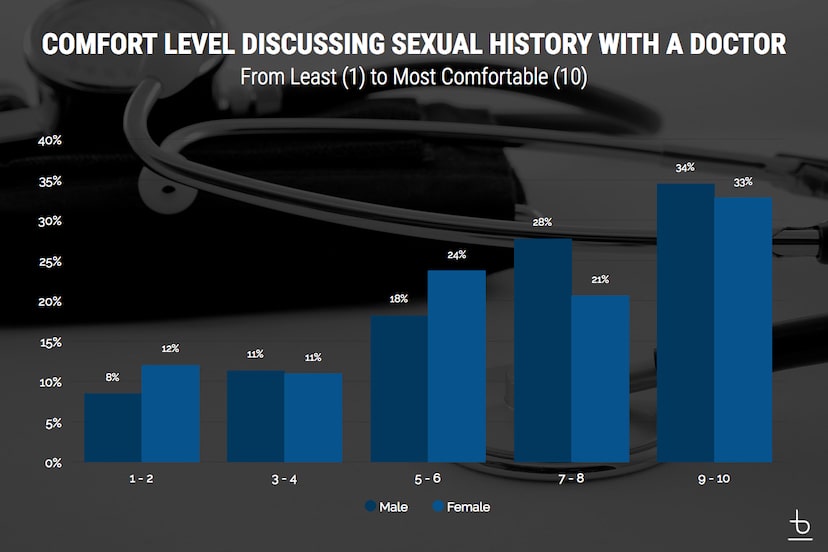
Overall, we were pleased to find that the majority of respondents said they were completely honest with their doctor (70%) about their sexual history. 25% said they were somewhat honest. Less than 5% of individuals said they were somewhat or mostly dishonest. Its crucial for patients to be honest with their physicians so that their doctor can prescribe the proper care. Knowing as many of the facts and as much of the patient’s history as possible gives the doctor the ability to provide the right options and the right treatments or procedures.
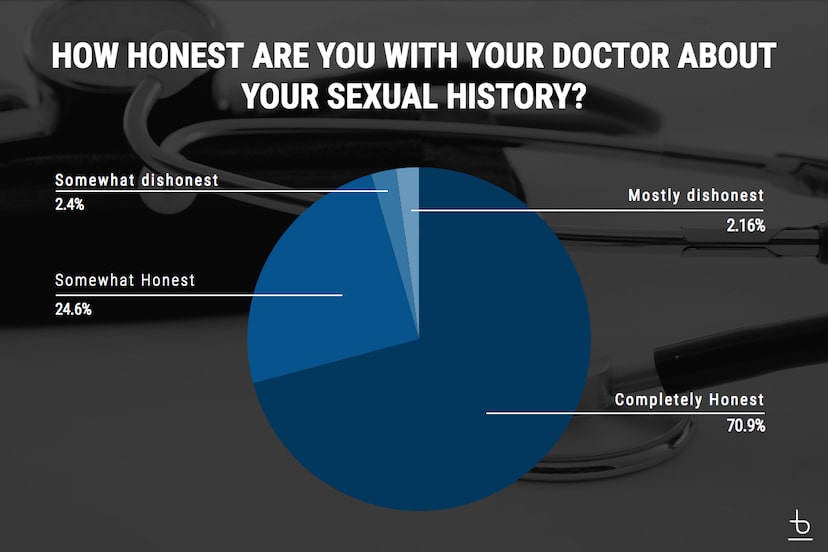
Summary
There were noticeable differences between straight and LGBTQ+ individuals when it came to what doctors are asking them, comfort levels, and how the two parties relate. It was encouraging that more gay and bisexual respondents were asked about HPV/Guardasil, anal pap smears, PrEP/Truvada, or prior STD exposure. But, the amount who said they had never been asked is still too high. When it came to having a doctor with the same sexual identity as them, most people said that it was very important. Gay and bisexual individuals seem to value it even more. Finally, the survey showed that most people are comfortable discussing their sexual history with their doctor and they are honest about it.
Getting the right care should be a priority for all patients. But how to achieve that is a two-way street. Doctors should be asking the right questions, especially if they know their patient is part of the LGBTQ+ community. Patients should be comfortable with their doctors and be able to openly and honestly discuss their sexual history without fear of judgement or shame. At Bespoke Surgical, we’re committed to being a leading advocate for patient care, especially among the LGBTQ+ community. Patients should not settle for substandard care and should demand more from their physicians when appropriate. This way we can make a better system for care and an overall healthier lifestyle for all, both in and out of the bedroom.
About the Author
Dr. Evan Goldstein is the Founder and CEO of Bespoke Surgical. Dr. Goldstein has extensive experience educating and shedding light on health care issues relating to the gay community, and has been published in several national publications including The Advocate, OUT Magazine, Vice, Refinery 29, NY Mag and more.
Join Our Newsletter
Subscribe to receive exclusive content, new product information, and the latest news.
Featured products
Read More
General
How Many Dating App Matches Does It Take To Find A Hookup?
When it comes to finding a hookup on dating apps, it’s truly a numbers game....
General
The Landscaping “Down There” Survey
What does the modern American’s hair removal routine really look like and what’s the motivation...
General
The Nudity Confidence Survey
The recent Vanderpump Rules drama has captivated audiences in the reality TV universe and shined...
